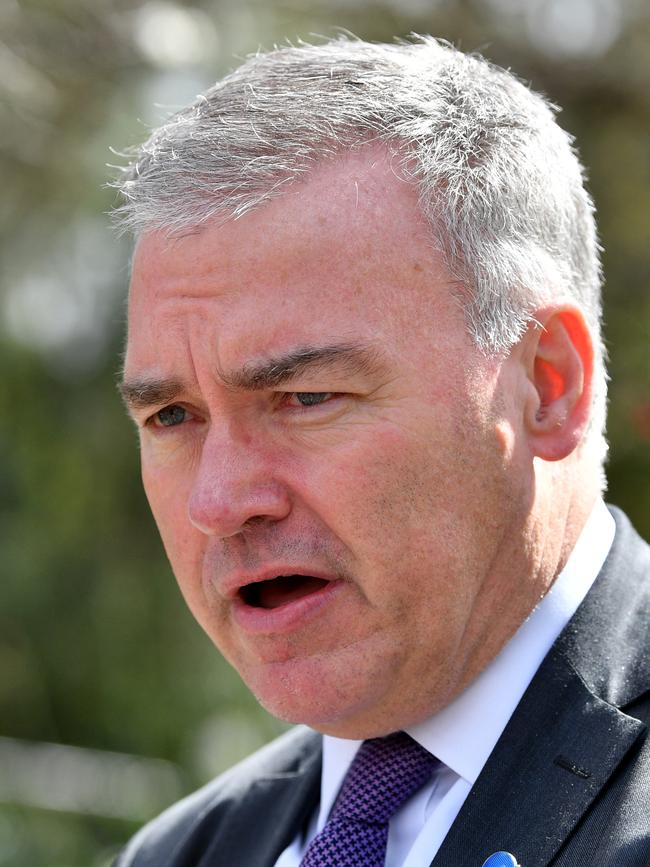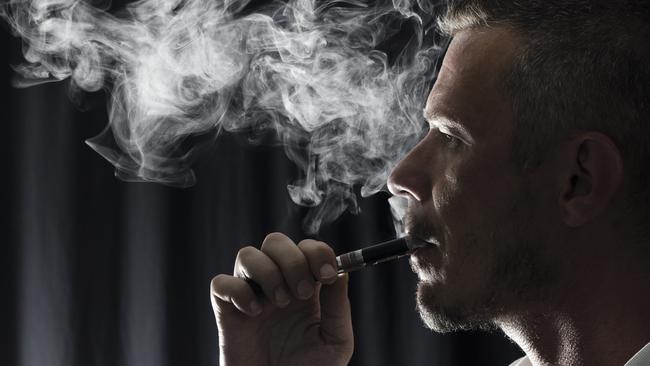Vaping industry’s future looking clouded as proposed SA laws would restrict e-cigarette sales
SHE lost her mum to smoking-related illness but Katherine Poole was only able to give up smoking after discovering vaping — now SA’s booming “vape shop” industry is worried about the impact of proposed new state laws.
- New Bill would treat e-cigarettes the same as tobacco
- Vape shop retailers fight back against changes
- Adelaide nightclub’s ‘free durries’ promo up in smoke
- Cost of cigarettes increases 199pc in 10 years
AFTER losing her mother to smoking-related illness when she was just 15 years old, Katherine Poole was never in any doubt that she needed to give up cigarettes.
Mrs Poole says she was a “young, rebellious smoker”, falling into the habit when she was a teenager.
She attributes her ability to finally kick the habit, 20 years later, to her discovery of e-cigarettes, or what’s commonly known as vaping.
“A girlfriend bought one from eBay and came around to our house with it,” Mrs Poole says.
“I was a bit sceptical to start with, but once I was educated about the device, we opened a store in late 2015.”
E-cigarettes are battery-operated devices that don’t use tobacco — instead they use vaporised nicotine, or non-nicotine solutions called e-liquids, that are super-heated to produce vapor for the user to inhale.
Vapor is not smoke — it is the gaseous form of the liquid solution, whereas smoke creates new cancer-causing chemicals from the process of burning.
Mrs Poole is among about 85 vape shop owners across the state who are anxiously awaiting a State Parliament debate on proposed legislation changes, which they say could ravage their industry.
The changes would mean e-cigarettes face all the same regulations as the tobacco industry, including bans on online sales, the use e-cigarettes in outdoor dining areas and in cars with children present.
Sellers would also be prevented from selling vaping devices to children, and promoting, advertising or giving away their products.
A raft of research on the topic has produced varied conclusions on e-cigarettes’ health impacts.
In Mrs Poole’s case, she says it took three months of vaping before she smoked her last cigarette, and now she uses only a small amount of nicotine in her device.
“Now I feel more energetic and I don’t feel like I’m gasping for breath,” she said.
There have been several pushes to regulate vaping since vaporisers began being sold in Australia four years ago, but the latest bill was tabled in Parliament at the end of July by Health Minister Stephen Wade.

It is expected to be debated late next month, and with support from the Labor Party, Opposition health spokesman Chris Picton expects new SA laws to be passed soon.
“There’s obviously mixed evidence and claims out there, and if you talk to the public health experts they’ll tell you different stories,” Mr Picton said.
“We’re not making it illegal to sell e-cigarettes in SA, but we think it’s sensible to have some sort of regulation … (for example) not using them in smoke-free areas, and not advertising them, which would be potentially reopening the idea of glamorising smoking again.”
The Cancer Council points out that there is inconclusive evidence on whether e-cigarettes can help people quit smoking — and says “studies increasingly show that e-cigarettes emit harmful substances”.
The state branch’s general manager of services, research and public policy Alana Sparrow welcomed the proposed changes, saying vaping had the potential to be a “gateway into tobacco”.
“There’s a lot of research being done at the moment as to the impact of e-cigarettes and whether they’re an effective cessation aid,” Mrs Sparrow said.
“SA is one of the last states to move on e-cigarettes and we’ve been talking to the government for quite a long time about the need to regulate the industry.”

She believed some of the flavourings available in e-cigarettes — which include tastes such as cinnamon cookie, chocolate and toffee apple — showed they were “definitely aimed at children”.
Mrs Sparrow pointed to the fact that major tobacco companies were now producing their own e-cigarettes.
“The reality is I don’t think the tobacco companies are doing it out of the good of their hearts. “If they’re producing these products, that speaks volumes to the impact they’re having on smoking rates.”
Savvas Dimitriou, the chairman of the Australian Vaping Advocacy, Trade and Research group, or AVATAR, said vaping was “substantially safer” than smoking tobacco because there was no combustion involved.
The vape industry’s peak body had been pushing for regulation, he said — particularly in areas such as a ban on selling to minors, and rules around the manufacture and labelling of e-liquids.
AVATAR members already ban unaccompanied children from their shops, perform ID checks and prevent minors from buying products online.
However, Mr Dimitriou said the proposed changes went too far and could cripple business owners, forcing the industry underground, and resulting in some store owners moving their companies interstate.
He said about 200 people were directly employed by the SA vaping industry, which brought $60 million in revenue to SA.
A ban on marketing and promoting vaporisers meant shop owners could no longer allow customers to try different flavoured liquids to find one they liked — nor could they be shown how to safely use vaporisers.
“The only thing an online ban could do is damage SA business — it won’t stop anyone from buying online because they could just buy from interstate or overseas,” Mr Dimitriou said.
Dr Colin Mendelsohn, chairman of the Australian Tobacco Harm Reduction Association, said while vaping was not recommended for non-smokers or children, “we see vaping as an alternative for adult smokers who want to quit”.
He said the Royal College of Physicians in the UK had found vaping was no more than 5 per cent as harmful for people’s long-term harm as smoking.
A government spokesman said its proposed legislation would introduce important public health measures to reduce harm associated with e-cigarettes and bring SA in line with most other states and territories.
Under the legislation, the fines for tobacco-related offences would also increase, including a maximum penalty for selling to minors lifting from $5000 to $10,000, and expiation fees increasing from $315 to $500.
“We have consulted with businesses selling e-cigarettes and will continue to work with them around the impact of regulations,” the government spokesman said.
